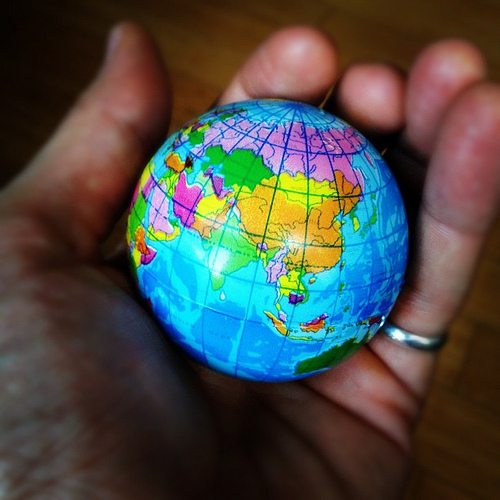

Features
Costing the Earth: Intergovernmental Panel on Climate Change
The Intergovernmental Panel on Climate Change’s (IPCC) AR5 report, published two weeks ago, was scientists’ surest declaration yet of the certainty of human-caused climate change. It is much too early to guess at what impact the report might have, but in a special episode of BBC Radio 4’s Costing the Earth, Tom Heap was joined by a panel of leading scientists and thinkers to discuss what the report really means for all of us.
Heap introduces the show from the Met Office, discussing the process that leads to the (more-or-less) reliable forecasts we receive every day, when deciding between the umbrella and the Ray-Bans.
From a large basement filled with banks of supercomputers, where our climate is diagnosed, he reminds the listener (if the listener needs any reminding) that we must worry not just about how the weather affects us, but how we affect the weather.
Perhaps one of the most notable things about the IPCC’s latest review of the physical science of climate change is that, on the whole, it doesn’t contain much new information. Save for attempting to address a few issues that have been raised since the last report, such as the slowdown of warming, the report is mostly a statement of increasing confidence.
Sir Mark Walport, the British government’s chief scientific advisor, tells Heap that it is a case of “singing the same tune with greater clarity”.
Mark Lynas, a writer and environmental activist, argues that the report “has pretty much demolished most […] sceptic theories”, but as Mark Hulme, professor of climate and culture at King’s College London adds, “Moving from very likely to extremely likely is hardly going to change the game in relation to the geopolitics of climate change.”
Discussing the measurable impacts of global warming, Prof Julia Slingo, chief scientist at the Met Office, points to the Arctic as the place where the most empirical early impacts of climate change are hitting. This is despite misleading claims by elements of the press that increasing ice cover this year means that warming has stopped. As Walport adds, each of the last three decades have been warmer than the one before.
Heap asks if the increasing frequency of extreme weather is a portent of climate change, or not connected? It is an question that Slingo and Tony Grayling, head of climate change and communication at the Environment Agency, cannot answer, with Grayling saying only that evidence suggests that extreme weather events will increase in future.
Slingo refers to a study that claims that half of all the extreme weather events of the last year were caused by climate change, but adds that some impacts of global warming are being left out of the debate. Rain patterns, for example, will change, meaning water scarcity for thousands.
The inclusion of Bjorn Lomborg in Heap’s panel is in itself arguably contentious. Many of the arguments in his most famous book, The Skeptical Environmentalist, have been repeatedly questioned – with Lomborg accused of scientific dishonesty, although the accusations were later withdrawn for technical reasons.
Indeed, his place on the panel seems a fair example of the BBC giving undue prominence to counter-opinion in a desire for balanced argument; something Greg Barker, minister of state for climate change, has this week criticised. At least, it might have been hoped that his comments stirred some debate, which they certainly did.
Lomborg claims that the majority of economic models indicate that a ‘moderate global warming’, something he defines as around 1C or 2C, will overall be a net positive for the world, with the caveat that this net positive will not be evenly distributed.
This being radio, it is impossible to tell, but it may be fair to assume the idea of a global warming silver lining would have raised some eyebrows among the panel.
Slingo disregards this idea, pointing to the claims of the IPCC that warming is likely to be considerably more than Lomborg’s ‘moderate’ amount, adding, “If we get up somewhere near 4C then the implications around the world for food security, house security, energy security and political security are immense.”
The debate turns to the recent political arguments over energy, with Heap asking whether if we are more concerned about cheap energy than green energy, does humanity have the will to stop climate change?
Lynus says that engaging the public is a struggle: “The narrative of climate change has always been framed as in ‘you’ve got to give something up,’ ‘you’ve got to stop flying on holidays,’ ‘you’ve got to have a colder house’, and things people interpret as taking away from their levels of comfort and enjoyment of life.
“Little things such as unplugging your phone charger just don’t stack up. We have to have very huge structural changes.”
Slingo argues that to act, politicians must feel public pressure. “I think we haven’t won that argument yet”, she says. “Until we do, politicians will continue to look at their own national interests and being elected again.”
Conversely, Walport argues that politicians are listening, but are faced with extreme challenges. The IPCC’s report, he says, is not a turning point but a waypoint. To progress further, we must discuss the policies that are now required, rather than the all but certain accuracy of the science.
The show then closes with a talk by Dr Emily Shuckburgh from the British Antarctic Survey, who has recently become a mother. Talking about the world in which her daughter will grow old, Shuckburgh’s poignant words are ultimately the most appropriate reminder of what the IPCC’s report really does mean for us all.
































